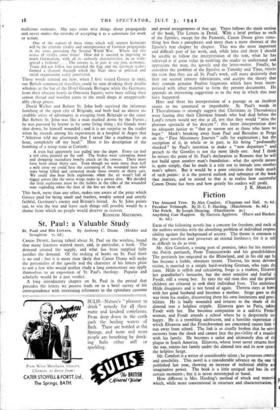St. Paul : a Valuable Study
CANON DEANE, having talked about St. Paul on the wireless, found that many listeners wanted more and, in particular, a book. The demand created the supply, and what has been supplied fully justifies the demand. Of the making of books on St. Paul there is no end ; but it is more than likely that Canon Deane will make the personality of the apostle and the character of his letters plain to not a few who would neither study a long commentary nor .apply themselves to an exposition of St. Paul's theology. Popular and scholarly would be a just verdict.
A long introductory chapter on St. Paul in the period that precedes the letters we possess leads on to a brief survey of his correspondence with interesting references to the epistolary customs and postal arrangements of that age. There follows the main section of the book, The Letters in Detail. With a brief preface to each of the Epistles, except for the Pastorals, Canon Deane gives some- thing less than a paraphrase and more than a mere abstract of the Epistle's text chapter by chapter. This was the most important and difficult part of his work, and, while here and there I should be unable to follow the interpretation of the text, what he has achieved is of great value in enabling the reader to understand and appreciate the man, the apostle and the letter-writer. Finally, he considers the problem of the Epistles to Timothy and Titus, rejects the view that they are all St. Paul's work, still more decisively that they are second century fabrications, and accepts the theory that they contain genuine Pauline fragments which have been incor- porated with other material to form the present documents. He appends an interesting suggestion as to the way in which this may have happened. Here and there his interpretation of a passage or an incident seems to me unnatural or improbable. St. Paul's words in I Thessalonians iv strongly suggest that Christians in Thessalonica were fearing that their Christian friends who had died before the Lord's return would not rise at all, not that they would "miss the glorious spectacle of his descent ": this latter interpretation does no adequate justice to "that ye sorrow not as those who have no hope." Mark's breaking away from Paul and Barnabas at Perga on the "First Missionary Journey" calls for explanation ; but the ascription of it, in whole or in part, to his being "profoundly shocked" by Paul's intention to nuke a "new departure" and preach to the Gentiles is not the most likely one. And I think he misses the point of St. Paul's declaration in Romans that he will not build upon another man's foundation: what the apostle means is, quite simply, that he made it a rule not to intrude into another man's sphere. But it would be a poor criticism that made much of such points : it is the general outlook and substance of the book that matters, and to attend to that is to realise how successful Canon Deane has been and how greatly his readers will profit.
J. K. Monza,.


























 Previous page
Previous page